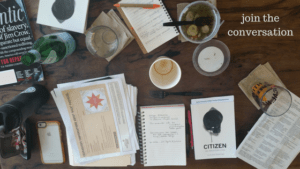My guest author today is Desiree Morales, who writes in response to Claudia Rankine’s Citizen, the Big Read book choice for 2017-18. Desiree Morales is the Entrepreneurship Coordinator for the Career and Technical Education Department of the Austin Independent School District. She is currently completing her first year as part of AISD’s Cultural Proficiency and Inclusiveness Cohort. Her poetry has appeared in What Rough Beast, Conflict of Interest, and Truck. (I highly recommend Desiree’s poem “Anthropocene,” from What Rough Beast.)
I was at the Blanton a few weeks ago standing in Ellsworth Kelly’s Chapel, and I just breathed for a little while. I was exhausted from a full day with the AISD Cultural Proficiency and Inclusiveness cohort—a group of forty educators learning how to do equity work in our schools. It’s the most grueling work I have ever loved to do, and I wish there was no reason for me to do it. Tonight I’m back to hear Claudia Rankine read and discuss Citizen, An American Lyric, and I’m filled with contradictory sentiments again: I’m excited to hear one of the great poets of my life read from a painful book I wish we didn’t need.
Citizen is a book of poems about the black experience in 21st century America. And if you’re hesitating to read it because you’re not a poetry person, this is the perfect book of poems to make you reconsider. Citizen shows you how poetry can be a salve, a tool, the thing you need when you think you need answers. These poems can be more than objectively true. In Rankine’s words:
The fiction of the facts assumes innocence, ignorance, lack of intention, misdirection; the necessary condition of a certain time and place.
Have you seen their faces?
These and other lines of Rankine’s—from Citizen and Don’t Let Me Be Lonely, which you should also read—are buzzing in my mind along with the good-bad excitement. Rankine sits directly in front of me and I spend a good ten minutes refraining from leaning in to whisper that I’ve read every single one of her poems out loud, even the early ones from Nothing in Nature is Private. Then she is standing at the podium under the enlarged image from Citizen’s cover: the hood from a black hoodie against a white background. She tells us about the artist, and how people have assumed lines from the book are about Trayvon Martin, when really they are about Rodney King. This seems like a perfectly instructional mistake. From outside of the black experience Citizen feels very “of the moment” to some of us, when really its subject matter has been urgent the entire lifetime of everyone in the audience.
She talks about commissioning art and disliking the outcome, asking friends about the last time racism appeared in their lives and turning their responses into poems. She tells us to vote like our lives depend on it, and it feels like we know her, and then I realize it feels nothing like we know her. We trust her. I think the (mixed, but mostly not-black) audience is here because Citizen reached us, and we want to see what else this brilliant poet can tell us about this American racism in which we are complicit. She makes it clear that she doesn’t have answers, and that makes me trust her more.
I can’t decide if the mixed, but mostly not-black audience makes me happy or uncomfortable. I’m happy to see all these co-conspirators in the fight against racism seeking out an opportunity to listen and understand. But—enter complete discomfort—what if the audience reflects a lack of access for the black community? And then I wonder, why do I get to be here instead of somebody black?
When you participate in Cultural Proficiency work you must agree to “experience discomfort.” Another rule is that it’s an inside-out process, meaning you start by examining your own biases and privilege, and I think you never stop; this is part of your work forever. Rankine ends the reading the way she ends her book, perfectly modeling another tenet of Cultural Proficiency: Accept non-closure. In her words:
Yesterday, I begin, I was waiting in the car for time to pass. A woman pulled in and started to park her car facing mine. Our eyes met and what passed passed as quickly as the look away. She backed up and parked on the other side of the lot. I could have followed her to worry my question but I had to go, I was expected on court, I grabbed my racket.
The sunrise is slow and cloudy, dragging the light in, but barely.
Did you win? he asks.
It wasn’t a match, I say. It was a lesson.
My thanks to Desiree for inviting us into this experience!
 Please join us for an intimate discussion of Claudia Rankine’s Citizen: An American Lyric, sponsored by ACC’s Division of Liberal Arts: Humanities & Communications. Discussions are facilitated by LAHC faculty.
Please join us for an intimate discussion of Claudia Rankine’s Citizen: An American Lyric, sponsored by ACC’s Division of Liberal Arts: Humanities & Communications. Discussions are facilitated by LAHC faculty.
Tuesday, April 17th 2-3:30pm Thunderbird Cafe (Koenig)
Wednesday, April 18th 11am-1pm Holy Grounds (St. David’s Episcopal Church)
Thursday, April 19th 3-5pm Kick Butt Coffee
Monday, April 23rd 3:30-5pm Pacha Cafe
Tuesday, April 24th 1-3pm Black Sugar Cafe
Tuesday, April 24th 7-8:30pm BookWoman
Wednesday, April 25th 7-9pm St. Elmo’s Brewing Company
